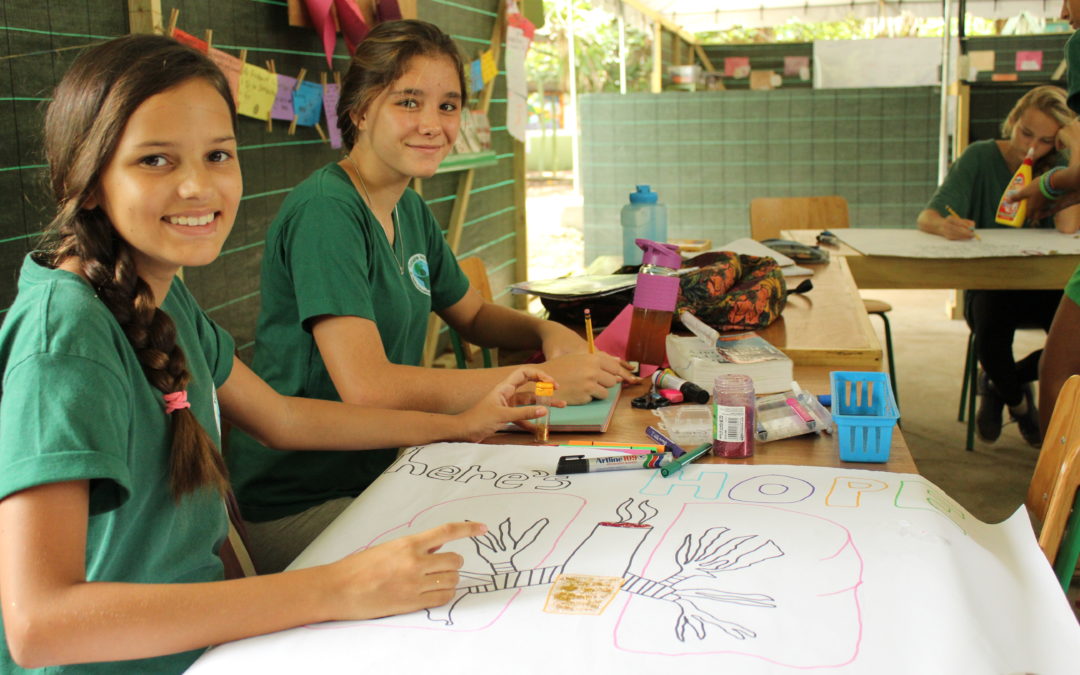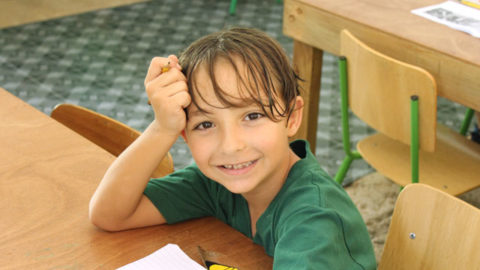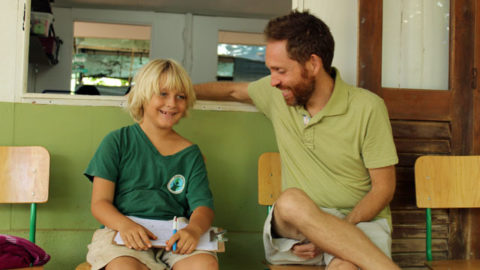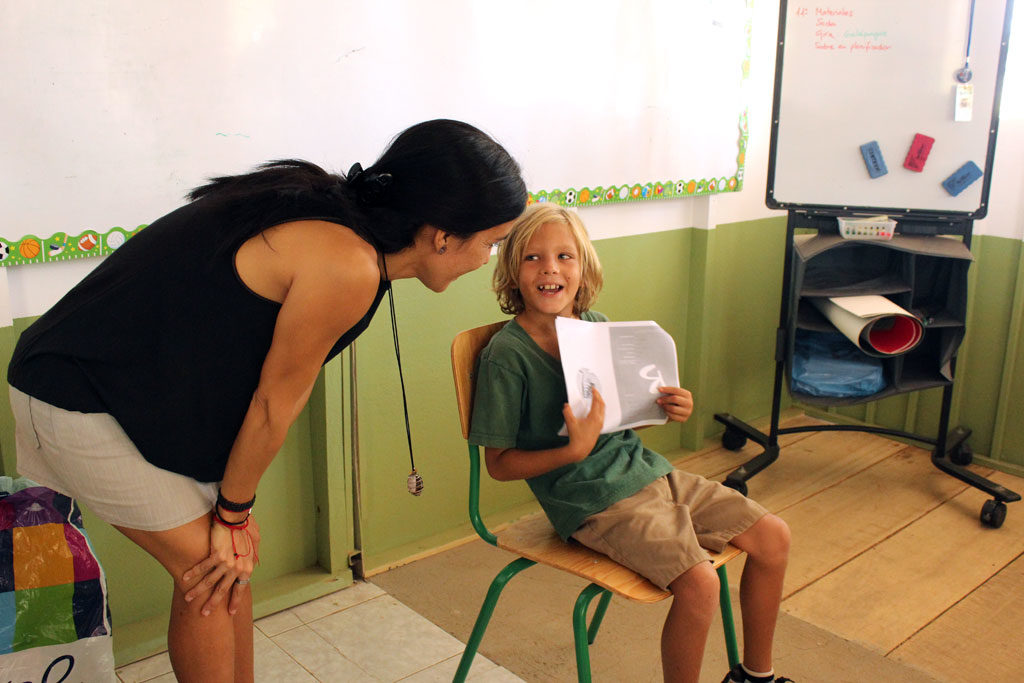
by Stuart Millar, IB coordinator | Jun 18, 2016

Íntegros: Actuamos con integridad y honradez, con un profundo sentido de la equidad, la justicia y el respeto por la dignidad y los derechos de las personas en todo el mundo. Asumimos la responsabilidad de nuestros propios actos y sus consecuencias. (de perfil de comunidad de IB)
Como padres, profesores, y personas adultas sabemos que nuestras acciones tienen secuelas. Si reflexionamos, a lo mejor todos podemos pensar en una ocasión en la que la falta de acción también tuvo consecuencias, y, además, en un momento en el que nuestras decisiones no solo afectaron a nosotros mismos, sino también a personas cercanas. Sea cual sea nuestra edad, responsabilizar de nuestras acciones puede resultar desafiante.
Es posible observar comportamientos distintos a todas las etapas de desarrollo de un niño: comportamientos impulsivos sin considerar las consecuencias, la desorganización o el letargo que conducen a quedarse rezagados y a enfrentar las consecuencias, o la tendencia de culpar a los demás en lugar de aceptar responsabilidad. Gracias a las experiencias que vivimos, hemos adquirido conocimientos. Ahora, ¿Cómo les ayudamos a nuestros hijos a aprender de manera positiva de sus experiencias ?
Tomen el tiempo de ayudarles a reflexionar. He aquí algunas preguntas para provocar discusiones: ¿Cuándo empezaron a salir mal las cosas? ¿Podrías haber previsto las consecuencias? ¿Cómo te afectó? ¿Cómo fueron afectados los demás? Los niños suelen pensar que la palabra ‘consecuencia’ solamente tiene una connotación negativa. Subrayen las decisiones buenas que condujeron a consecuencias positivas y celébrenlas. Por último, tanto padres como profesores, debemos tomar medidas razonables e implementarlas de modo sistemático. Por ejemplo, si todos deseamos que nuestros estudiantes sean exitosos, debemos ayudarles a organizarse. En caso de una fecha de entrega, apoya al estudiante a respetarla y a enfrentar y lidiar con la situación cuando no cumplió con la expectativa.

by Stuart Millar, IB coordinator | Jun 18, 2016

Principled: We act with integrity and honesty, with a strong sense of fairness and justice, and with respect for the dignity and rights of people everywhere. We take responsibility for our actions and their consequences. (Taken from IB learner profile)
As parents, teachers, and humans who’ve just lived a lot of life, we know that our actions have consequences. If we take the time to reflect, we can probably all think of an occasion where not acting has also had consequences, and about a time when our choices have not only just affected us, but those around us. No matter how old we are, taking responsibility can sometimes be very tough!
At all ages and stages of a child’s development we might see different things: impulsive behavior with no thought about what the consequences might be; disorganization or lethargy which causes a student to fall behind with their work, leaving them with consequences to contend with; or a tendency to blame others rather than accept responsibility and fault. A lot of what we now know came to us through our own experiences. How do we help our children turn their experiences into positive learning ones?
Take opportunities to help your children reflect. Some questions to get them thinking and discussing might be: Where did things start to go wrong? Could you have predicted those consequences? How have you been affected? How have others been affected? Often, children think the word consequence only has a negative connotation. Point out where good decisions led to good consequences and celebrate those decisions. Finally, as parents and teachers, we should be careful to not only lay out reasonable consequences but consistently enforce them. For example, we all want our students to be successful, but part of being successful is being organized. If there is a deadline, help enforce it and make sure you have the difficult conversation about how conscious actions led to the current situation.

by Stuart Millar, IB coordinator | May 31, 2016

Communicators: We express ourselves confidently and creatively in more than one language and in many ways. We collaborate effectively, listening carefully to the perspectives of other individuals and groups. (Taken from IB learner profile)
At Futuro Verde there certainly are a lot of ways to communicate! With eight different languages at home and three languages of instruction at school, 65% of our students are bilingual or multilingual; staff reflect the same diversity, with approximately half being bilingual. It’s a learning environment with people of all ages and from different backgrounds at their own stage of language development – sharing similar challenges, frustrations and personal victories. Remember! If someone is having a tough time communicating, it doesn’t mean they don’t have a lot to share – it’s just locked away for now. Certainly, do not assume that difficulty in communicating comes from a lack of intelligence!
We’re accustomed to a ‘good’ communicator expressing themselves through speaking and writing. However, spend even a short amount of time at Futuro Verde and you will see that our students use a multitude of ways to communicate. Just as they all learn in different ways, some might feel more comfortable communicating in other ways too. Sometimes you feel you understand most about someone when they are competing, performing, playing their instrument or painting.
Being a good communicator depends on feeling safe to be able to express oneself without fear of criticism or recrimination. Weekly peace practice provides such an environment. Students feel comfortable to share a joke of the day, or something more personal, because they know they are surrounded by other good communicators. Their peers understand that effective communication involves listening respectfully even if they don’t agree.

by Stuart Millar, IB coordinator | May 31, 2016

Comunicadores: Nos expresamos con confianza y creatividad en diversas lenguas, lenguajes y maneras. Colaboramos eficazmente, escuchando atentamente las perspectivas de otras personas y grupos.(Perfil de Comunidad de Aprendizaje de IB)
¡En Futuro Verde existe una multitud de formas de comunicación! Con ocho idiomas distintos que se hablan en el hogar y tres idiomas de instrucción en la escuela, el 65% de nuestros estudiantes son multilingües o bilingües. Se discierne la misma variedad entre los empleados, dado que la mitad de ellos son bilingües. Estamos hablando de un entorno del aprendizaje marcado por una gran variedad de personas de edades y orígenes distintos, cada una de ellas en su propia etapa de adquisición lingüística donde compartimos retos similares y victorias personales. Recuerden si alguien no se muestra comunicador, no es que tenga poco a compartir, sino que le cuesta expresarse temporalmente. No asuman que las dificultades de comunicación se radican en un bajo nivel de inteligencia.
Estamos acostumbrados a que un buen´comunicador se expresa mediante el habla y la escritura. No obstante, aun durante una estancia breve en Futuro Verde, notarán que nuestros estudiantes se comunican de varios modos. Así como todos aprendimos de maneras distintas, algunos se sienten más a gusto comunicando de manera distinta. En ocasiones, sentimos que para conocer a alguien a fondo, hay que verlo competir, actuar, tocar un instrumento o producir arte.
Los buenos comunicadores prosperan al sentirse seguros y libres de temores a las críticas o las recriminaciones. Las prácticas semanales de paz ofrecen tal ambiente. Los estudiantes se sienten libres de temores cuando comparten un chiste o una noticia personal porque saben que otros buenos comunicadores los rodean. Sus compañeros entienden que la comunicación eficaz se centra en escuchar respetuosamente a los demás, aun cuando no estamos de acuerdo.

by Stuart Millar, IB coordinator | May 18, 2016

In preparation for submitting our request for authorization to the IB in October we are well underway with teacher professional development. A high class program with successful students comes from having well prepared teachers. Over the next few months teachers will be attending IB workshops in their specific subject areas. In addition, in-school professional development will focus on preparing teachers for these workshops as well as preparing them to write their proposed IB course outlines. Other exciting activities include a visit by our teachers to La Paz Community School in Guanacaste, a bilingual IB school.






